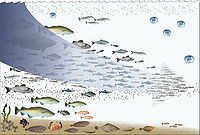Environmental effects of fishing

When people go fishing, they try to catch fish so they can eat them or sell them. But did you know that fishing can have an impact on the environment? Here’s how.
First, when lots of fish are caught in one area, it can cause the population of that kind of fish to decrease. This is called overfishing. When too many fish are caught, there aren’t enough left to reproduce and make more fish. This can be a big problem because some fish are very important to the ecosystem in the ocean. If they disappear, it can have a negative effect on other animals and plants in the ocean.
Second, sometimes fishing methods can harm other animals or the environment. For example, some fishing nets are so large that they catch not only the fish that they’re trying to catch, but also other animals like turtles, sharks, dolphins, and whales. These animals can get hurt or even die because of this. Also, sometimes fishing boats use chemicals to catch fish, which can hurt other animals or damage the ocean floor.
Finally, when people don’t follow fishing regulations, it can cause harm to the environment. Fishing regulations are rules that tell people when, where and how they can catch fish. If these rules aren’t followed, it can mean that people catch too many fish, catch them at the wrong time of year or in the wrong places, or use methods that are harmful to the environment.
So, fishing can have both positive and negative effects on the environment. It’s important that people fish responsibly so that they can enjoy fish for many years to come without harming the ocean and the animals that live there.
First, when lots of fish are caught in one area, it can cause the population of that kind of fish to decrease. This is called overfishing. When too many fish are caught, there aren’t enough left to reproduce and make more fish. This can be a big problem because some fish are very important to the ecosystem in the ocean. If they disappear, it can have a negative effect on other animals and plants in the ocean.
Second, sometimes fishing methods can harm other animals or the environment. For example, some fishing nets are so large that they catch not only the fish that they’re trying to catch, but also other animals like turtles, sharks, dolphins, and whales. These animals can get hurt or even die because of this. Also, sometimes fishing boats use chemicals to catch fish, which can hurt other animals or damage the ocean floor.
Finally, when people don’t follow fishing regulations, it can cause harm to the environment. Fishing regulations are rules that tell people when, where and how they can catch fish. If these rules aren’t followed, it can mean that people catch too many fish, catch them at the wrong time of year or in the wrong places, or use methods that are harmful to the environment.
So, fishing can have both positive and negative effects on the environment. It’s important that people fish responsibly so that they can enjoy fish for many years to come without harming the ocean and the animals that live there.
Related topics others have asked about:
Destructive fishing practices,
Environmental effects of meat production,
Finless Foods,
Human impact on the environment,
Individual fishing quota,
Marine debris,
One Fish, Two Fish, Crawfish, Bluefish,
Population dynamics of fisheries,
Shark culling,
Shark finning,
Sustainable seafood,
The End of the Line: How Overfishing Is Changing the World and What We Eat
